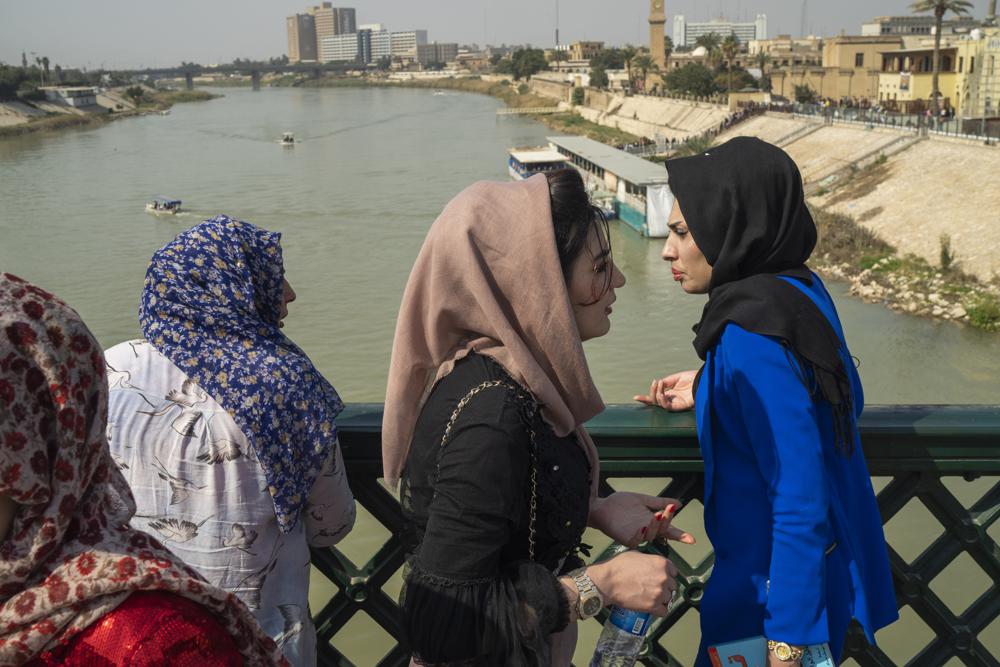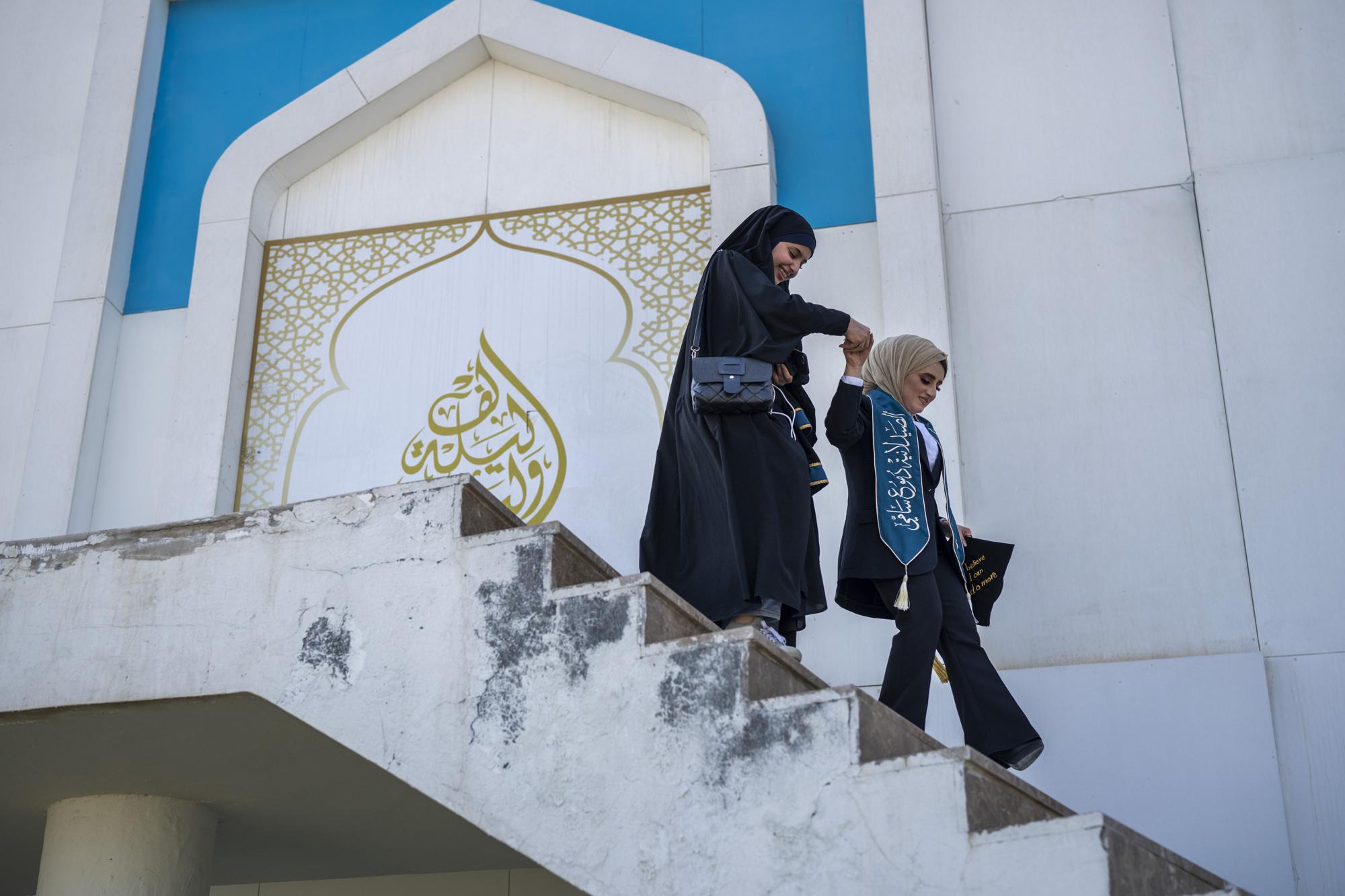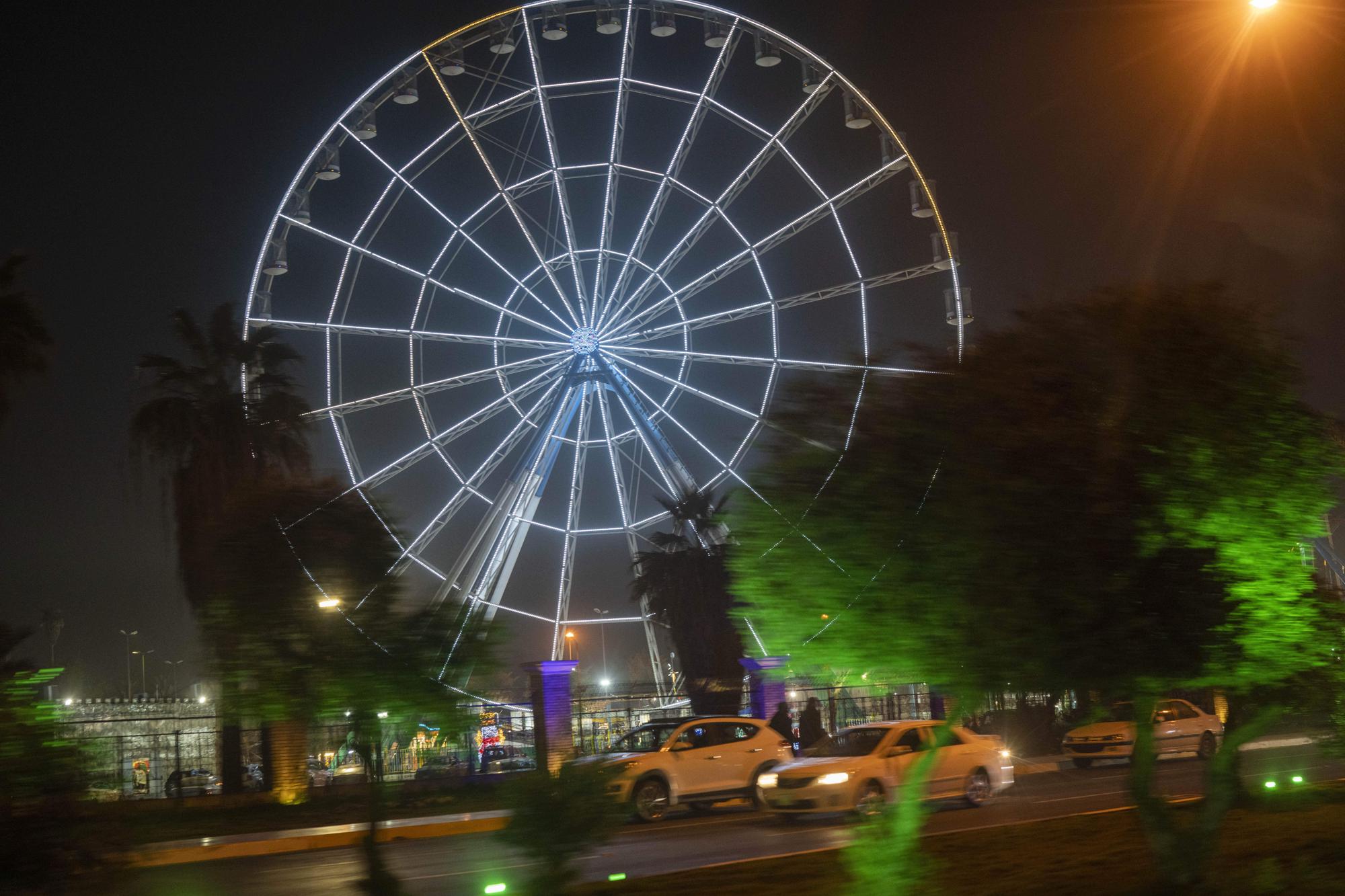The mission of the US-led invasion of Iraq in 2003 was to liberate the Iraqi people and destroy weapons of mass destruction. Two years later, the CIA's chief weapons inspector reported that no nuclear, chemical, or biological weapons stockpiles had ever been discovered. Today, Iraq's capital is bustling with life and a sense of renewal, with residents enjoying a rare, peaceful respite in the midst of a painful modern history. Affluent young men cruise their muscle cars in a former al-Qaida hotspot, and a recreational cycling club hosts weekly biking trips. A few glitzy structures shine where bombs once fell.
Since the war in Iraq created a power vacuum, Iran, Arab Gulf states, the United States, terrorist organizations, and rival sects and political parties in Iraq have been vying for control of the oil-rich country. Between 2003 and 2019, an estimated 300,000 Iraqis as well as more than 8,000 American service members, contractors, and civilians perished. The time was marked by years of unreliable electricity and other public services, as well as unemployment, dislocation, sectarian violence, and terrorism.
Young Iraqis expressed their regret for the loss of stability that followed Saddam's overthrow in dozens of recent interviews from Baghdad to Fallujah, but they also said the war was over and many were optimistic about emerging freedoms and chances to follow their dreams.
Safaa Rashid, a 26-year-old writer with a ponytail, discusses politics with friends in a welcoming coffee shop in the capital's Karada neighborhood. The café and its patrons could just as easily be found in Brooklyn or London thanks to its well-stocked library nook, images of Iraqi authors, and travel posters.
Rashid was just a young boy when the Americans arrived, and he regrets "the loss of a state, a country that had law and establishment" that came as a result of the invasion. The Iraqi state lay broken and vulnerable to international and domestic power struggles, he said. Today is different; he and like-minded peers can sit in a coffee shop and freely talk about solutions.

A different café on a different day, Noor Alhuda Saad, 26, a PhD candidate at Mustansiriya University who describes herself as a political activist, says her generation has been leading protests decrying corruption, demanding services and seeking more inclusive elections — and won’t stop till they’ve built a better Iraq.
She tapped her pale green fingernails on the table as she claimed that the old-guard Sunni and Shiite parties, as well as the militias and gangs that they were associated with, "did not understand about sharing democracy" after 2003.
She continued, accusing the government of failing to restore public services and create a fully democratic state in the wake of occupation. "Young people like me are born into this environment and are trying to change the situation," she said. “The people in power do not see these as important issues for them to solve."
The former Palestine Hotel, Ferdous Square, the Green Zone, and the airport road pockmarked by IED and machine-gun attacks have been landscaped or covered in fresh stucco and paint.
The American "shock-and-awe" bombs' bright orange flashes and concussions, tanks rolling along the embankment, Iraqi forces fighting across the Tigris or wading into the water, and civilian casualties are all vivid memories of the invasion of Iraq. As Iraqi civilians started robbing ministries and U.S. Marines toppled the iconic Saddam statue, pillars of smoke rose over the city.
The protracted, expensive experience in Iraq revealed the limits of American power to export democracy and chastened Washington's approach to international relations. The occupation sparked fierce battles for control of the countryside and cities, a protracted civil war, and the ascent of the Islamic State organization.
The streets of Baghdad, the second-largest city in the Middle East after Cairo, are constantly bustling with traffic and commerce. Daily life is not all that different from any other Arab city, but there are sporadic clashes with IS group remnants in the remote deserts of northern and western Iraq. Digital natives are pushing the limits of free speech and identity, and corruption is pervasive. Recently, social media influencers were arrested in a crackdown on "immoral" content, and authorities said they would enforce a long-dormant law banning alcohol imports.

A number of election law changes were made in 2019–20 as a result of protests by Iraqis against corruption and the lack of basic services, allowing more minorities and independent groups to participate in politics. In Fallujah, the largest city in the Anbar region, which was once a hotbed for al-Qaida and the Islamic State group, three 18-year-olds are returning home from school. In 2004, four Blackwater employees were ambushed, their bodies were dragged through the streets, hacked, burned, and displayed as trophies by local insurgents at the Euphrates Bridge. Under the leadership of former governor of Anbar Mohammed al-Halbousi, who has assisted in allocating millions of dollars in government funding to rebuild the city, Fallujah is currently undergoing a construction renaissance.
Fallujah is changing, gaining new residences, medical facilities, amusement parks, a promenade, and an updated city gate. Officials are hesitant to allow Western journalists to explore the city unaccompanied, though. Such tensions, according to imam and mosque leader Dr. Huthifa Alissawi, are nothing compared to what his congregation endured when the Islamic State group captured Fallujah. He recorded 16 murders of mosque members and is taking pleasure in the newfound security he feels in Fallujah.
More than 1.5 million people live in Sadr City, an eastern Baghdad suburb that is predominantly Shiite, conservative, and working-class. The portraits of Moqtada al-Sadr, a fiery populist religious leader who was shot dead by assailants during Saddam's rule, and his father, an ayatollah, still loom large.
Haider al-Saady, 28, and Ali al-Mummadwi, 22, are friends who operate side-by-side shops that are powered by generators. They put in ten hours a day of work and laugh at the president of Iraq's assurances that things will get better for the next generation. Although anti-Saddam sentiment was rife in Sadr City, Al-Saady expressed fondness for the peace of that time.

When word got out that Khalifa OG, a Baghdad-born and raised musician, would be headlining a rap party at a fancy new restaurant in western Baghdad, his fans expressed their excitement via texts and Instagram. Khalifa OG raps about joblessness and satirizes authority, but his lyrics aren't overtly political. His song "Sheikhs" makes fun of "sheikhs" who wield power in the new Iraq due to wealth or political connections. One of the societal wounds that rappers and their fans want to heal is the Sunni-Shia sectarianism that led to a pitched civil war in Iraq from 2006 to 2007. Secular young people say that unlike their parents who lived under Saddam, they are not afraid to make their voices heard, even in the face of backlash from pro-religious parties.
Iraq's prime minister, Mohammed Shia al-Sudani, took office in October and is a former government minister for human rights and governor of Maysan province. He received backing from a coalition of pro-Iranian Shiite parties and refused to leave Iraq, even after his father and five brothers were executed. In a former Saddam palace, he is working to restore regional relations and balance the interests of Shiites, Sunnis, and Kurds. His first priority will be to build trust between the people and the government, and he wants to see tangible results such as job opportunities, services, and social justice. Ketaib Hezbollah, a proxy for Iran and a cousin of Hezbollah in Lebanon and Syria, is one of the Shiite militias that took part in the campaign against the Islamic State group.
Jafar al-Hussaini, spokesman for Ketaib Hezbollah, met AP at an outdoor restaurant in Baghdad's Dijlas Village, an opulent, 5-month-old complex of gardens, spas, and a dancing fountain overlooking a Tigris bend. He expressed optimism for the new Iraqi government and scorn for the United States, claiming that the US sold democracy to Iraq but failed to deliver infrastructure, electricity, housing, schools, or security. His project is ideological, and he opposes the United States.
Far from such luxuries, 18-year-old Mohammed Zuad Khaman, who works in his family's kebab café in one of Baghdad's poorer neighborhoods, resents the militias' grip on the country because it prevents him from pursuing his dream of becoming a professional athlete.
Khaman is a talented footballer who claims he can't play in Baghdad's amateur clubs because he has no "in" with the militia-related gangs that control the city's sports teams. offer to train in Qatar, he said, but a broker wanted $50,000, which was far beyond his family's means.
According to him, war and poverty caused him to miss several years of school, and he is currently attempting to complete his high school diploma. He is one of the Iraqis who wish to leave the country. " In contrast, Muammel Sharba, 38, who managed to get a good education despite the war, sees the new Iraq as promising in ways he did not expect. on a government scholarship from Iraq.
Sharba visited his home country last year and was impressed by the changes. He discovered Baghdad's fledgling bicycling community and recently rode to Samarra, site of one of the war's worst sectarian attacks in 2006. He also noticed improved technology and less red tape, which enabled him to upload his thesis and have his foreign Ph.D. validated online. He's noticed smoother roads as infrastructure has improved. Diyala's security isn't perfect, but it's better than it was. Sharba prefers to see the glass as half-full.
"I don't believe European countries have always been as they are now. "They went through a long process with many obstacles, and then they gradually improved," he said. "I believe we, too, must go through these steps."
Sharba was among a double line of excited cyclists threading a course through the capital's busy streets on a recent evening. As they walked out, they saluted with their neon-green arms.
As the daylight faded into a crimson sunset, it wasn't difficult to imagine Iraq, like them, on its way to a better place.